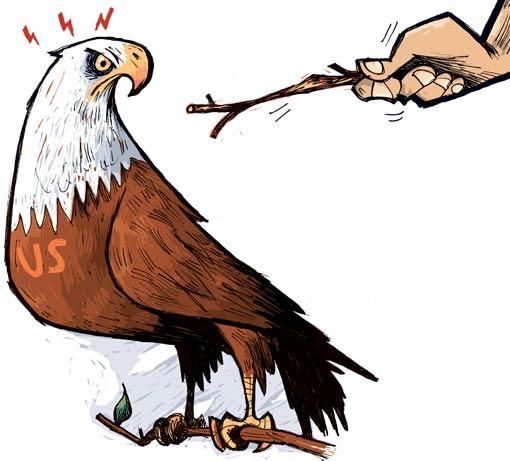US-Iranian relations have deteriorated rapidly in recent months. Despite the ongoing dialogue between the two countries over Iraq, the US military has accused Iran of arming and financing most of the attacks against coalition forces in Iraq.
The most serious allegation was made last week by Michael Jones, deputy director for politico-military affairs for the US Joint Chiefs of Staff. Jones told the Washington Post that more than 70 per cent of attacks on US troops in Baghdad in July were carried out by Shiite militias.
Of that figure, the US commander added, "some of them have had Iranian training". Similar allegation was made last month when General William Caldwell, Multi-National Force-Iraq spokesman accused Iranian special forces of using "Shiite Lebanese Hezbollah fighters to train Iraqi extremists to attack US troops in Iraq".
Iraq is one aspect only of a multifaceted tension between the two arch enemies in the region. Iran is accused of backing the insurgency in Afghanistan, supporting "terrorist" organisations in Lebanon and Palestine, pursuing nuclear weapons and by extension threatening vital US interests throughout the region.
Current dialogue
Many observers believe that the US is preparing the stage to stop Iran from going nuclear, by military force if necessary. The current dialogue between the two countries is believed to be nothing but an attempt by the US to buy more time for its military machine to get prepared to hit Iran.
Given their proven political skills, Iranian officials must be aware of the danger of provoking the furious and frustrated US military. Past experience denotes also that the Iranian regime will, if pressured, back off and opt for reconciliation.
Ever since its revolution, Iran has been trying to strike a balance between two conflicting priorities: Islamic values and national interests; ideological determinants and pragmatic considerations.
This balance was not easy to hold most of the time but the victory was almost always in the side of pragmatism, particularly when the survival of the regime was at stake or when national interests deemed that necessary.
Earlier this year when tension skyrocketed with the US, the supreme guide of the Islamic revolution and Iran's de facto ruler Mohammad Ali Khamenei took the nuclear file from the hardliner Ahmadinejad and allowed other members of the regime to talk about Iran's willingness to start a comprehensive dialogue with the US to resolve the issue.
The concern over an American attack, like the one that destroyed Iraq's Osirak nuclear reactor in 1981, forced the Iranian regime to moderate its political behaviour towards accommodating the US pressure and preventing such an attack.
During the Najaf crisis of 2005, some analysts expected Iran to take a more aggressive stand as the US military edged closer to the shrine of Imam Ali, aiming at crushing the rebellion of Shiite leader Moqtada Al Sadr.
To the disappointment of many, Iran's reaction did not pass the edge of rhetoric.
Former president Mohammad Khatami called on Muslim countries to hold an emergency summit meeting for the Organisation of the Islamic Conference to help stop what he described as a "human and spiritual catastrophe" in the city of Najaf.
Iran's hardliners who usually dub the US as the "Great Satan" went merely a step further when they blamed President George W. Bush for the Najaf crisis and warned that "Muslim youth in Iran, Pakistan, Saudi Arabia and all Muslim countries will jeopardise America's interests in the region". Two years on, nothing of that sort has so far happened.
Continue to harass
If its revolution was declared in the name of Islam and if it continues to present itself as the champion of Shiite Islam and protector of its holy places, does not mean that Iran will risk a confrontation with the only remaining world superpower.
Iran will indeed continue to harass the US and exploit its current troubles in the region to get more concessions. It will also continue to act as one of the loudest opponents of US policy in the Middle East and the Gulf.
It will never, however, seek political suicide by pushing hard enough to trigger a US attack. In politics, this game is called brinkmanship. The danger when it is played, however, is that one can never know when and where to stop before it is too close to the edge.
Dr Marwan Kabalan is a lecturer in media and international relations, Faculty of Political Science and Media, Damascus University, Syria.











